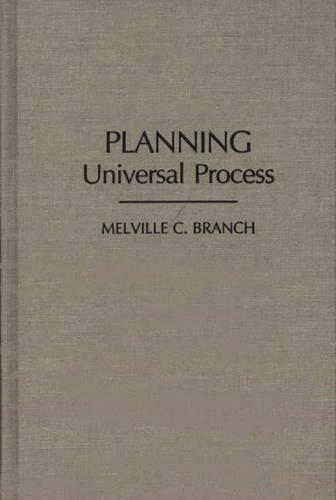
Planning: Universal Process
(Hardback)
Available Formats
Publishing Details
Planning: Universal Process
By (Author) Melville C. Branch
Bloomsbury Publishing PLC
Praeger Publishers Inc
12th February 1990
United States
Classifications
Tertiary Education
Non Fiction
658.4012
Physical Properties
Hardback
247
Width 140mm, Height 210mm
454g
Description
Planning: Universal Process is undoubtedly the best book ever written on the art and intellectual discipline that constitutes effective planning, in which every unit of our society, indeed every individual, must continually engage. Each chapter is an amazing and fascinating selection of pertinent items from anthropology, history, economics, and architecture all combined through innovative analytical reasoning that demonstrates the importance of planning in attaining success in human endeavors. Simon Ramo Co-founder, TRW, Inc. This pioneering work presents planning as a process involved in all human activity. The author demonstrates that the condition and prospects of people depend on it more than any other of their endeavors. The book covers, in clear and plain language, the major considerations to be taken into account in successful planning: its historical roots, development over time, procedural characteristics, context, the various kinds of planning, its different forms under different conditions, its institutionalization, successes and failures, potential contributions. The book emphasizes that there is a core of knowledge concerning means and methods that is fundamental to effective planning, and should be understood by those concerned with any one of its many applications. To the extent this basic knowledge is shared among planners, it promotes a mutually beneficial interchange of information and techniques. Planning is improved in practice and advanced as an intellectual discipline. This book should be of interest to practitioners in the different types of planning engaged in by civil governments, businesses, and the military services. It is academically important, an excellent text or reference for educational purposes. It is also interesting and stimulating to read.
Reviews
"Dr. Branch is one of that rare breed whose work has built to a crescendo of comprehensiveness, quality, and strength of exposition and expression from his first books to what is clearly the magnum opus' in the literature of planning. He has placed planning within a comprehensive philosophical context that correctly identifies planning as a universal process that can--nay, must be applied if the increasing complexities and conflicts of humanity are to be successfully resolved. This work should be required reading in every school of planning, government, architecture, engineering, public and business administration, political science, law, military training...in fact, in any program wher e rational decision-making is an ingredient in the skills to be acquired."-Lee E. Koppelman Executive Director, Long Island Regional Planning Board
"Perspective--experienced, deeply informed, comprehensive, and forward-looking--is the distinctive quality of this analysis of planning as a universal process. The author has been engaged as a leader in planning practice and scholarship virtually from the beginnings of formal inquiry into the field in the United States. The culmination of that leadership is this exceptional book."- Chester A. Newland Professor of Public Administration University of Southern California and Editor in Chief, Public Administration Review
"Undoubtedly, the best book ever written on the art and intellectual discipline that constitutes effective planning, in which every unit of our society, indeed every individual, must continually engage. Each chapter is an amazing and fascinating selection of pertinent items from anthropology, history, economics, and architecture all combined through innovative analytical reasoning that demonstrates the importance of planning in attaining success in human endeavors."- Simon Ramo Co-founder, TRW, Inc.
Author Bio
MELVILLE C. BRANCH is Professor of Planning in the School of Urban and Regional Planning at the University of Southern California. He is author of over 17 books, including Regional Planning (Praeger, 1988).
